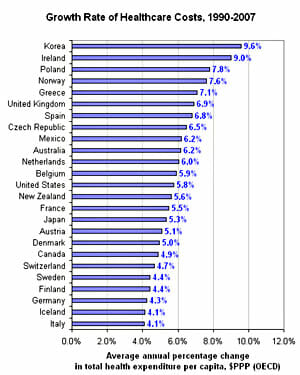Bait And Switch Alert -- Increased Expenditures <> Increase Costs
Kevin Drum presents this chart:

Look at the top and the bottom of the chart. The top says "growth of health care costs" while the bottom says "average annual percentage change in total health expenditures." Drum goes on in his post to use rising expenditures and rising costs interchangeably. I responded in the comments:
Um, I hate to bring measurement and data integrity into this discussion, but "costs" and "expenditures" are not the same thing.
Total per capita expenditures at Wal-Mart have gone up over the last 20 years by a lot. The cost of items sold at Wal-Mart have not increased by nearly so much. The difference is the volume of purchases.
Let's say 20% of this country was getting no health care. If next year, everything stayed the same but suddenly these 20% could buy the same amount of health care as everyone else, our per capita expenditures would go up by at least 20%. This does not mean the cost goes up. It means we bought more of it. It would be a good thing, not a "cost"
Only from one perpective, that of a single payer, are the words "per capita expenditures" and "costs" the same. In such a scenario, but no other, having people get more health care is an increase in costs, rather than an improvement to the population.
I think this is at the heart of what makes many people worry about single payer health systems -- that increased volume of use is a "cost", so that in turn decreasing supply and volume of use is a reduction in cost. It is this whole way of thinking that equates increased usage with increased costs that makes people suspicious of government run systems, and fear that cost reductions will come through usage restrictions.
We might well expect that in wealthy countries like the US, as the per capita percentage of people's budgets taken up by food and other necessities drops, that health care spending might increase. What better way to spend incremental wealth than on our own health? In anything else - housing, food, travel, whatever -- I would suspect that Mr. Drum would consider increasing per capita spending as a good thing, as a sign of wealth and increasing well-being. Why is health care treated just the opposite?
Can someone tell me if Mr. Drum has learned anything from Coyote's frequent and gracious efforts to educate the man?
I'm glad you're willing to read Kevin Drum so I don't have to.
Shall I venture to my blog to write the post
Ahhh, but I think you can't deny that costs and expenditure in every system (even the American) are related at least or depend by a percentage on each other. I mean it is worse in Germany or France (which have a system more similar to the US than to Great Britain, but with a "public option" - or many such). So, here costs and expenditure are the same, but the system seems to be more efficient than the US.
And believe me this doesn't result in long waiting lines, like in countries that RATION their health-care access. Actually, France is averse to rationing their health-care, they rather increase their debt or take more taxes.
This is by no means a defense of the French system, but it shows that the French system is actually more competitive on cost-savings and reduction of unnecessary procedures, which often times clog the US system (just remember your ridiculous appointment ratio for eye lenses).
http://www.d3kicks.com/forum/read.php?1,30240#t6-3 [url=http://www.d3kicks.com/forum/read.php?1,30261#t6-3]acomplia online[/url] cheap viagra cheap tramadol [url="http://www.d3kicks.com/forum/read.php?1,30243#t6-3"]buy cialis online[/url] [LINK http://www.d3kicks.com/forum/read.php?1,30259#t6-3%5Dlevitra%5B/LINK%5D kwug
http://jahshaka.org/forum/member.php?u=15270#t6-4 [url=http://jahshaka.org/forum/member.php?u=15267#t6-4]cheap viagra[/url] buy cialis online buy fioricet [url="http://jahshaka.org/forum/member.php?u=15264#t6-4"]buy diazepam[/url] [LINK http://jahshaka.org/forum/member.php?u=15252#t6-4%5Dbuy hydrocodone[/LINK] wgbf
Thank you for another great post.
I look forward to many more entries with high quality info.
craigslist software